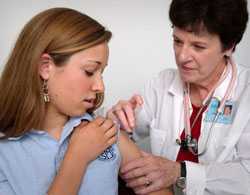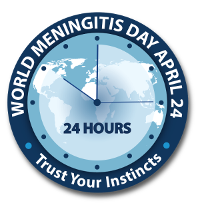Meningococcal Vaccines for Preteens, Teens
 Talk with your teen’s clinician about meningococcal vaccination to help protect your child’s health. Meningococcal disease is a very serious illness where death can occur in as little as a few hours.
Talk with your teen’s clinician about meningococcal vaccination to help protect your child’s health. Meningococcal disease is a very serious illness where death can occur in as little as a few hours.
Meningococcal disease is not very common in the United States, but teens and young adults are at increased risk. There are licensed vaccines to help prevent the most common types of meningococcal disease in the United States.
CDC Recommends Meningococcal Vaccines for Preteens and Teens
All 11 to 12 year olds should be vaccinated with a single dose of a meningococcal conjugate vaccine. CDC recommends a booster dose at age 16. The booster dose gives teens continued protection during the ages when they are at highest risk. If your teenager missed getting a dose, ask their clinician about getting it now.
Teens and young adults (16 through 23 year olds) may also be vaccinated with a serogroup B meningococcal vaccine, preferably at 16 through 18 years old. Multiple doses of serogroup B meningococcal vaccine are needed and the same brand must be used for all doses. Talk with your teen’s clinician if you are interested in serogroup B meningococcal vaccination.
Helpful Terms
- Meningitis: An infection of the tissue covering the brain and spinal cord.
- Neisseria meningitidis: The bacteria that cause meningococcal disease.
- Septicemia: A serious bloodstream infection; blood poisoning.
- Serogroup: A group of bacteria that are closely related; there are five serogroups of Neisseria meningitidis that cause most meningococcal disease in the world — A, B, C, W, and Y.
Meningococcal Vaccines Are Safe but Side Effects Can Occur
About half of the people who get a meningococcal conjugate vaccine have mild problems following vaccination, such as redness or pain where the shot was given or a mild fever. These reactions usually get better on their own within 1 to 2 days, but serious reactions are possible.
Following serogroup B meningococcal vaccination, more than half of the people who get the vaccine will have mild problems:
- Soreness, redness, or swelling where the shot was given
- Tiredness (fatigue)
- Headache
- Muscle or joint pain
- Fever or chills
- Nausea or diarrhea
These reactions usually get better on their own within 3 to 7 days, but serious reactions are possible.
Some preteens and teens might faint after getting these or any shots.

Meningococcal conjugate vaccine is routinely recommended for 11 to 12 year olds. A booster dose is needed at age 16.
Meningococcal Disease Causes Serious Infections
Meningococcal disease refers to any illness caused by Neisseria meningitidis bacteria. The most common illnesses are infections of the tissue covering the brain and spinal cord (meningitis) and bloodstream infections (septicemia).
Symptoms of Meningococcal Disease Can Appear Quickly
Symptoms of meningococcal meningitis may include sudden onset of a high fever, headache, or stiff neck. Other symptoms can include nausea, vomiting, increased sensitivity to light, and confusion. Symptoms of meningococcal septicemia include fever, tiredness (fatigue), vomiting, and a dark purple rash. If you think you or your child has any of these symptoms, call the doctor right away.
Early Diagnosis and Treatment Are Very Important
Doctors treat meningococcal disease with antibiotics (medicines that kill bacteria in the body). However, even with antibiotic treatment, 10 to 15 out of 100 people with meningococcal disease will die. About 11 to 19 out of every 100 survivors will have long-term disabilities. These disabilities can include loss of limb(s), deafness, nervous system problems, or brain damage.
Meningococcal Disease Spreads from Person to Person
People spread the bacteria that cause meningococcal disease to others by sharing respiratory and throat secretions (such as saliva or spit). Even people who are not sick can have the bacteria in their noses and throats and spread the bacteria. Generally, it takes close (for example, coughing or kissing) or lengthy contact to spread these bacteria. Fortunately, they are not as contagious as germs that cause the common cold or flu. People do not catch them through casual contact or by breathing air where someone with meningococcal disease has been.
Outbreaks of Meningococcal Disease Are Rare
Only about 2 or 3 out of 100 meningococcal disease cases occur as part of an outbreak. However, outbreaks are unpredictable and the outcomes can be devastating to affected communities and organizations. Meningococcal outbreaks can occur in communities, schools, colleges, prisons, and other populations.
More Information
More Information

- Meningococcal disease information
- Meningococcal vaccination
- For parents of teenagers: Information about meningococcal vaccination
- Meningococcal disease outbreaks
- Podcast: Meningococcal immunizations for preteens and teens
- Preteen and teen vaccine information and materials
- CDC vaccination resources for parents
- Vaccines for Children program
- For healthcare professionals: Preteen and teen vaccination promotion materials
- Page last reviewed: April 24, 2017
- Page last updated: April 24, 2017
- Content source:
- National Center for Immunization and Respiratory Diseases, Division of Bacterial Diseases
- Page maintained by: Office of the Associate Director for Communication, Digital Media Branch, Division of Public Affairs




 ShareCompartir
ShareCompartir